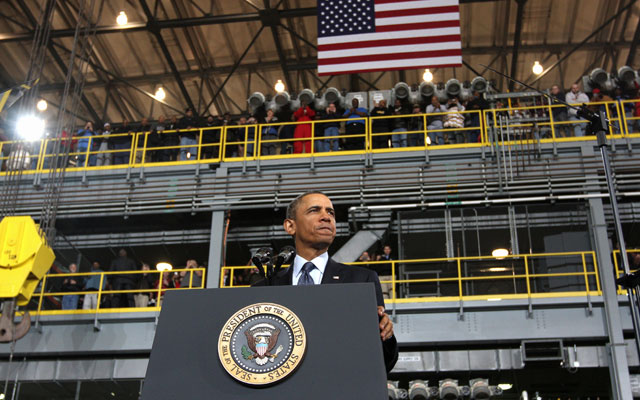President Obama visited Newport News Shipyard yesterday—the largest naval shipbuilding facility in the world—to warn of sequestration’s effects on the U.S. Navy. Yet throughout his first term as Commander in Chief, he did nothing to stop the shrinking fleet.
While the Administration has recently attempted to sound the alarm on the USS Harry S. Truman’s canceled deployment to the Middle East, it was just a few months ago that the President disparaged such fleet concerns during a national debate. When Mitt Romney argued that we are facing the smallest U.S. fleet in nearly a century, Obama retorted:
We have these things called aircraft carriers where planes land on them. We have these ships that go underwater, nuclear submarines. And so the question is not a game of Battleship where we’re counting ships. It’s—it’s what are our capabilities.
In addition to the Truman’s cancellation, it was recently announced that the USS Abraham Lincoln will delay its midlife refueling and maintenance due to budget concerns. This means the carrier fleet will fall below its minimum ship requirement for at least a few years. It also sends a message to both allies and adversaries that U.S. naval presence and commitment is declining.
The President’s nuclear submarine policy is also weaker than he declares. Even without sequestration, the Obama Administration delayed the development of the Ohio-class ballistic missile submarines’ replacement. These subs serve as the most survivable leg of the nuclear triad for years, but they are old and wearing out. The delay will reduce the Ohio fleet below acceptable levels for 14 years.
Make no mistake: President Obama’s sudden interest in military readiness is too little too late. He has been cheerleading the hollowing out of our military for the past four years, and his renewed interest comes with a dangerous caveat: He wants to raise taxes.
We agree that the sequester is far from perfect, which is why the House of Representatives voted and twice passed cuts to reprogram the sequester to avoid these kinds of cuts to the military. They presented alternatives that would restore America’s commitment to national defense—without raising taxes—and address national debt in a responsible manner. Neither the President nor the U.S. Senate gave these proposals serious consideration.
The Navy and other services are already suffering serious readiness concerns. With the world certainly not safer than a few years ago, the President should not hold the defense budget hostage. The ship has already sailed on $800 billion in cuts to defense while entitlement spending continues to grow. The Administration must work with Congress to make a commitment to national security as well as fiscal responsibility before it is too late.


























